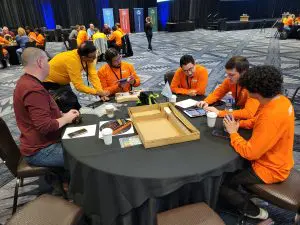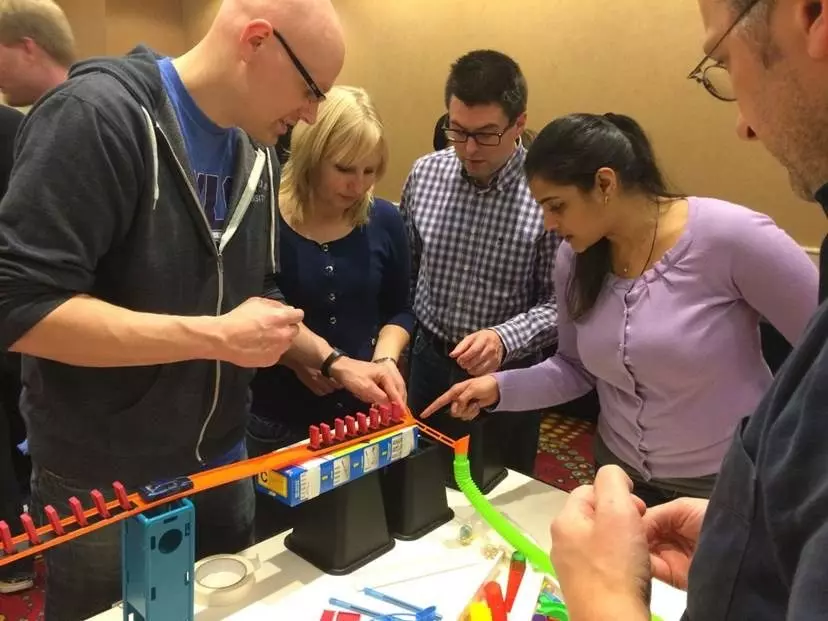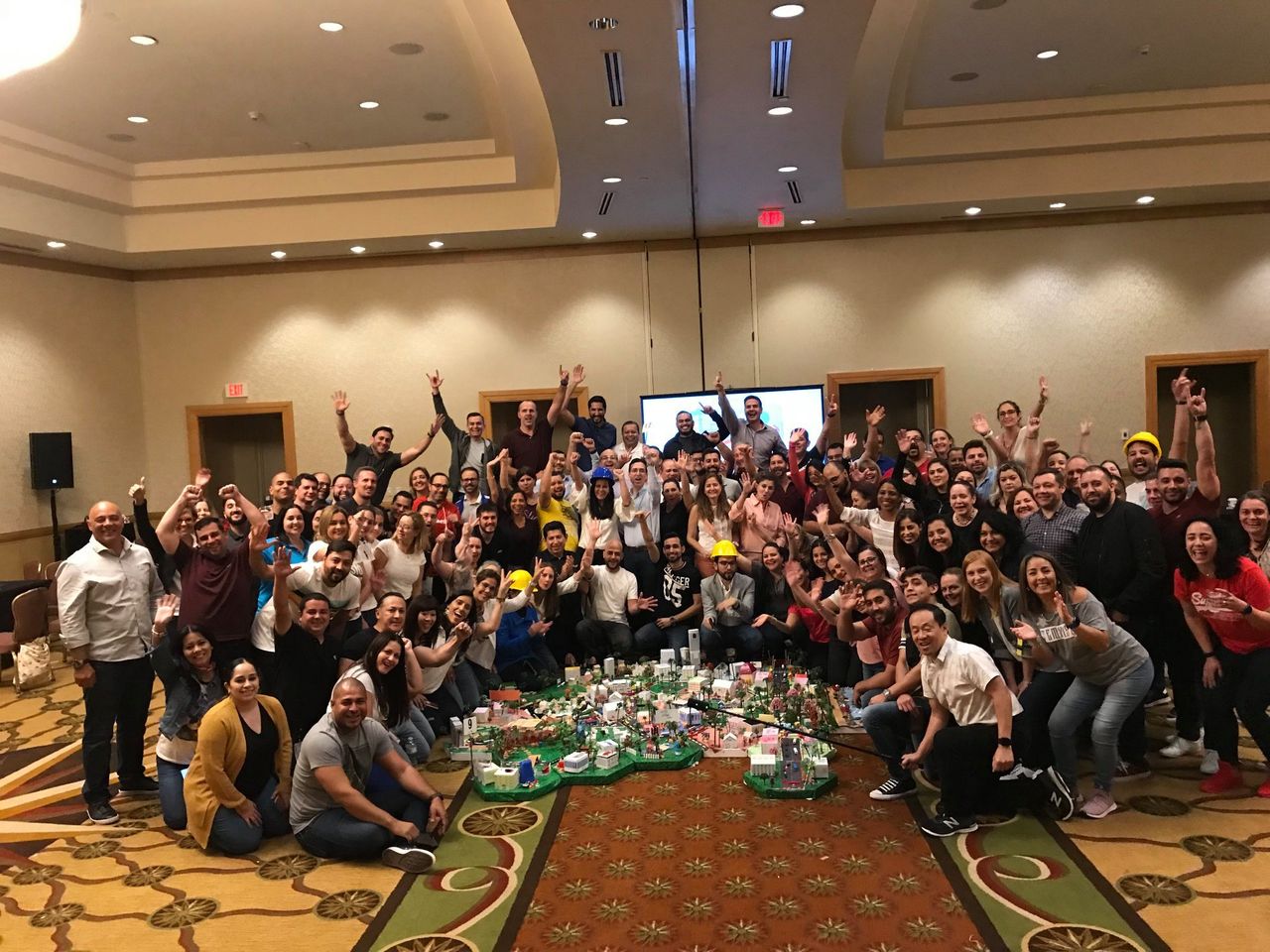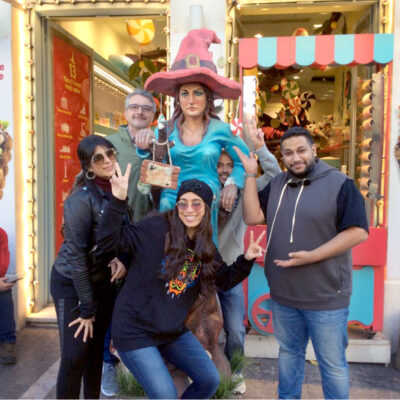Team building has been around for decades, but as workplaces continue to evolve (with hybrid schedules, dispersed teams, and shifting employee expectations), its value has never been greater. The truth is, in today’s world, the importance of team building in the workplace goes far beyond fun and games. It’s one of the most effective tools leaders have to strengthen engagement, communication, and productivity across every level of their organization.
According to Gallup’s 2024 State of the Global Workplace Report, only 23% of employees are engaged at work, meaning most teams are still struggling to feel connected and motivated. That’s where team building comes in. It provides the shared experiences that help people reconnect with one another—and with their purpose.
As the founder of TeamBonding, I’ve seen firsthand that team building isn’t just a “nice-to-have.” It’s the cornerstone of collaboration, creativity, and camaraderie: the foundation every thriving team is built on. Let’s explore what team building really means today, and why it’s one of the smartest investments you can make in your people and your company’s long-term success.
What Is Team Building?
So, what is team building exactly? At its core, team building is the process of bringing individuals together to form a cohesive group that works toward a shared goal. It’s about intentionally creating opportunities for shared purpose, trust, and connection: helping employees understand one another’s strengths and communicate more effectively in the process.
The purpose of team building is to strengthen the human side of work. Through shared experiences (whether they’re happy hours, creative workshops, or charitable activities), teams learn how to listen, adapt, and support one another. These moments translate directly into better teamwork, stronger culture, and higher performance back at the office.
At TeamBonding, we believe the best team building experiences are designed to be meaningful and memorable. That’s why our events range from structured professional development sessions to relaxed, laughter-filled gatherings like culinary challenges, corporate game shows, and charitable programs. Each one is built to create a sense of shared purpose that lasts long after the event ends.
Why Is Team Building Important?
Before diving deeper, let’s address one of the most common questions I hear: why is team building important? Simply put, because it delivers measurable results. Team building helps people see each other in a new light and connect beyond their day-to-day responsibilities. When departments work in silos, communication breaks down. Team building breaks those barriers. It brings people together to build trust, strengthen collaboration, and uncover shared purpose.
The benefits of team building extend far beyond morale. Research shows that highly engaged teams are 21% more profitable and experience 41% lower absenteeism. Those numbers reflect what I’ve seen firsthand: when people feel connected, they communicate better, solve problems faster, and handle conflict resolution with greater understanding and respect.
Every successful program starts with clear team building objectives, be it improving communication, encouraging creativity, or boosting cross-department collaboration. The end result is the same: stronger relationships, better teamwork, and a company culture that thrives on connection.
Common Misconceptions About Team Building
The importance of team building is often underestimated by leaders who haven’t yet seen how powerful it can be for connection, engagement, and morale. Many still picture outdated activities, like awkward icebreakers or cliché trust falls, but that’s not what real team building looks like today.
One of our Lead Facilitators, Kevin Pertusiello, explained it perfectly:
“There are still so many companies out there that have not tried team building and are just unsure because it’s unknown to them. And we win them over just about every single time.
Sometimes people have in their head that it’ll be corny or people are going to drag their feet, but that’s not what we do. Because if that’s what we were doing, we wouldn’t want to do it either.”
I’ve seen this play out time and time again. Even the most hesitant teams walk away surprised by how much they enjoy the team building experience and how much they gain from it. When done right, these activities boost morale, enhance communication, and develop leadership qualities that last long after the event ends.
Effective team building today is immersive, meaningful, and completely customizable to your goals. Whether it’s solving challenges together, giving back through charitable programs, or collaborating in a creative workshop, the right activity engages people in ways that truly matter, not ways that make them cringe.
15 Reasons Why Team Building is Important
The importance of team building in the workplace goes far beyond organizing a few fun activities. It’s a key part of shaping a strong, positive company culture. When people choose where they want to work, they’re not just thinking about salary or benefits; they’re also looking for an environment where they feel valued, supported, and connected. That’s where team building makes all the difference.
A healthy culture built on trust and collaboration attracts great talent, inspires loyalty, and drives long-term success. It shows employees that your company values more than just performance. Your company values people. When teams have the chance to connect, communicate, and celebrate together, they’re more motivated, creative, and productive.
Here are 15 powerful reasons why team building is essential for your employees and your company:
- Facilitates Socialization and Networking for the Greater Good
- Boosts Team Performance
- Promotes Adaptability and Reduces Stress
- Increases Team Spirit and Fun
- Sparks Innovation and Creativity
- Builds Trust Among Team Members
- Cultivates a Positive Company Culture
- Strengthens Problem-Solving Skills
- Demonstrates Employee Appreciation
- Bridges Gaps Between Departments
- Unlocks Leadership Potential
- Connects Teams Across All Levels
- Enhances Employee Engagement and Morale
- Increases Retention and Job Satisfaction
- Makes Conflict Resolution Easier
Now, let’s explore each of these benefits in more detail below.
1. Facilitates Socialization and Networking for the Greater Good
Strong relationships are the backbone of great teamwork. One of the most overlooked benefits of team building is how naturally it encourages people to connect, collaborate, and build friendships across all levels of the organization, whether they work together in person, remotely, or in a hybrid model.
According to Gallup, employees who have a best friend at work are not only more productive but also more engaged, innovative, and committed to their company’s success. That’s because meaningful social connections make it easier to share ideas, solve problems, and approach one another openly when challenges arise.
The purpose of team building isn’t just to have fun. It’s to create shared experiences that help employees find common ground and strengthen trust. When people feel comfortable reaching out to each other, communication flows more freely, and small issues are resolved before they become bigger ones.
Our corporate volunteering and CSR-focused events give teams the chance to make an impact together while strengthening those connections. From charity challenges to purpose-driven experiences, these programs remind employees that when they work together for the greater good, they’re not just building community; they’re building each other up, too.
2. Boosts Team Performance
High-performing teams don’t just happen. They’re built intentionally. One of the key team building objectives is to help employees better understand their own strengths and how those strengths complement others on the team. When people recognize what each person brings to the table, collaboration becomes effortless and productivity improves.
In fact, studies show that teams who play to their individual strengths see up to a 19% increase in performance. The right team building experience uncovers those natural talents, helping leaders assign roles that fit and employees feel more confident in their contributions.
At TeamBonding, programs like Chain Reaction turn communication and problem-solving into a high-energy challenge and proves that when teams learn how to work together effectively, their collective potential grows stronger with every connection.
3. Promotes Adaptability and Reduces Stress
greatest benefits of team building is how it helps employees build resilience and confidence in the face of constant change, whether that’s new technology, shifting priorities, or organizational transitions.
The importance of team building in the workplace goes beyond morale; it’s about creating space for open communication and continuous learning. These experiences help employees embrace change rather than resist it, giving them a sense of control and connection when things feel uncertain.
I’ve found that when teams take time to step back, laugh together, and problem-solve in a low-pressure setting, they return to work more grounded and prepared. Our Change Management program is a great way to help teams strengthen adaptability while also managing stress in healthy, constructive ways.
4. Increases Team Spirit and Fun
Every great team needs a sense of spirit and a reason to smile together. Too often, workplaces lose that spark, becoming a collection of individuals instead of a connected group. Over time, that lack of camaraderie drains motivation and creativity.
One of the most energizing benefits of team building is its ability to reignite enthusiasm and create moments of shared joy. When employees have fun together, they form bonds that translate directly into better collaboration, higher morale, and stronger engagement.
The right team building experience also supports mental well-being by giving employees a healthy outlet for stress and a chance to connect through friendly competition. Research shows that teams who incorporate playful challenges perform better and stay more motivated.
Programs like Beatswork channel that energy into something meaningful, turning laughter and teamwork into lasting motivation. When the team has fun together, everyone wins together.
5. Sparks Innovation and Creativity
Creativity thrives in environments where people feel safe to share ideas and take risks. One of the most valuable benefits of team building is how it creates that foundation of trust and openness by helping employees move beyond surface-level conversation into true collaboration.
The purpose of team building isn’t just to connect people. It’s to spark imagination. When employees feel comfortable expressing themselves, they’re more likely to innovate, experiment, and challenge old ways of thinking. That’s the heart of every forward-thinking workplace.
Professional development workshops and experiential programs are perfect for nurturing this kind of creativity through continuous learning. Our Breaking Barriers event, for example, encourages teams to face personal and professional challenges together, fostering empathy, respect, and fresh perspectives that fuel innovation long after the activity ends.
6. Builds Trust Among Team Members
Trust is the foundation of every strong team and one of the biggest reasons companies invest in team building experiences. These activities strengthen communication, collaboration, and mutual respect, helping employees feel more confident relying on one another.
The importance of team building in the workplace can’t be overstated. Studies show that 90% of employers believe fostering a sense of community directly impacts overall business success. When people trust their coworkers, they’re more open to feedback, more engaged in their work, and more likely to step up when challenges arise.
Today’s team building programs go far beyond old-school icebreakers. They’re designed to create authentic moments of connection through shared goals and meaningful collaboration. Our Charity Bike Build is a perfect example: teams work together to assemble bikes for children in need, strengthening trust while making a real difference.
7. Cultivates a Positive Company Culture
Company culture shapes how people feel, act, and perform at work, making it the heartbeat of any organization. A positive culture builds loyalty, reduces turnover, and drives collaboration, while a negative one can drain morale and productivity.
According to recent surveys, over 80% of Gen Z employees say a strong, healthy culture is one of the most important factors when choosing a new job. The importance of team building in the workplace lies in its ability to strengthen that culture by encouraging open communication and shared values.
Regularly scheduled team building activities help bridge the gap between leadership and employees, creating alignment across all levels. When people feel heard, included, and supported, they bring their best selves to work. Programs like City Build are designed to bring company culture to life by helping teams replace toxicity with trust and collaboration.
8. Strengthens Problem-Solving Skills
The best teams know how to think on their feet. Team building challenges encourage employees to approach problems creatively, communicate clearly, and test new strategies in a low-pressure, engaging environment.
These experiences strengthen critical thinking and adaptability: skills that translate directly to the workplace. When employees practice solving puzzles or working through strategy-based activities, they build confidence in their ability to handle real-world challenges together.
Programs like our escape rooms make problem-solving fun, interactive, and memorable. They remind teams that every challenge is an opportunity to collaborate, learn, and grow stronger together.
9. Demonstrates Employee Appreciation
When employees feel valued, they’re more engaged, motivated, and loyal. One of the most powerful benefits of team building is that it gives leaders a tangible way to show appreciation beyond words or emails. Taking time to celebrate your people through shared experiences tells them their hard work truly matters.
According to recent studies, more than half of employees have left a job because they didn’t feel appreciated. Team building activities help counter that trend by creating meaningful moments of recognition and connection. Whether it’s a one-time event or part of an ongoing employee incentive program, these experiences remind teams that they’re seen, valued, and supported.
Programs like Mission ImPAWssible make gratitude feel personal and rewarding. These programs combine teamwork with a charitable twist that lets employees give back while having fun together.
10. Bridges Gaps Between Departments
The purpose of team building extends beyond individual teams to unite the entire organization. Too often, departments operate in silos, limiting collaboration and understanding. Team building helps bridge those divides, creating a sense of shared purpose that strengthens the company as a whole.
As our Lead Facilitator Kevin Pertusiello often says, “It’s our job to get people to the same table to see eye to eye.” Whether teams have gone through mergers, restructuring, or simply work in different locations, connection is the key to building trust and alignment.
Encouraging employees to collaborate across departments fosters new relationships and sparks innovation. Programs like Beat the Box bring diverse groups together to solve complex challenges, proving that when departments collaborate, everyone wins.
11. Unlocks Leadership Potential
The right team building experience often reveals hidden leadership potential. When employees are placed in new, creative environments, they naturally step into different roles, experiment with decision-making, and inspire others in ways that might never surface in a traditional workday.
These moments can be eye-opening. A quiet new hire might demonstrate incredible communication skills under pressure, or a mid-level employee may emerge as a confident motivator during a challenge. By observing these dynamics, managers gain valuable insight into who’s ready for the next step in their development.
That’s one of the most powerful benefits of team building: it empowers people to lead without fear of making mistakes. These experiences help build confidence, emotional intelligence, and the ability to think strategically, all essential traits for future leaders.
Programs like Leadership Stories give teams the chance to explore what great leadership looks like through storytelling and collaboration. They not only develop new skills but also build trust and respect across departments, laying the foundation for a culture of shared leadership that lasts well beyond the event.
12. Connects Teams Across All Levels
One of the most meaningful benefits of team building is its ability to unite people across different levels of an organization, breaking down the invisible walls that often exist between leadership and staff.
When leaders participate alongside their teams, it sends a powerful message: we’re all working toward the same goal. That sense of equality helps employees feel valued, seen, and understood, regardless of title or tenure. It builds empathy and promotes open dialogue that carries over into daily work interactions.
The purpose of team building isn’t just to improve morale; it’s to strengthen alignment. Whether your team meets virtually, in a hybrid setup, or all under one roof, these shared experiences help create common ground. Programs like Virtual Taskmaster do this beautifully, giving everyone, from executives to new hires, a chance to contribute ideas, showcase creativity, and celebrate wins together.
When people at every level are connected, collaboration becomes effortless and company culture grows stronger from the inside out.
13. Enhances Employee Engagement and Morale
One of the key benefits of team building is its ability to re-energize employees by giving them a break from daily routines and an opportunity to reconnect through shared experiences.
Regularly scheduled team building events help employees feel valued and appreciated, leading to higher motivation, creativity, and job satisfaction. According to Gallup, engaged teams show 23% higher profitability and significantly lower turnover. Those numbers reflect something I’ve seen for decades: when people enjoy where they work, they perform better.
The purpose of team building is to nurture connection and well-being. When teams step away from their desks to collaborate, laugh, and recharge, they return with renewed focus and stronger relationships. Programs like Corporate Retreats help companies create that space to unwind and strengthen morale in meaningful, lasting ways.
14. Increases Retention and Job Satisfaction
The importance of team building in the workplace becomes clear when you look at retention. In today’s competitive job market, employees stay where they feel connected, valued, and supported. Team building fosters those feelings by creating trust, belonging, and shared purpose: three factors that strongly influence long-term job satisfaction.
More than half of employees say they’ve left a job because they didn’t feel appreciated. That’s why it’s essential to create an environment where employees see a future for themselves. Personalized team building experiences can be designed to reinforce company values, celebrate milestones, or support professional growth, all while keeping work enjoyable.
Programs like Breaking News AI do just that, encouraging collaboration and innovation through creative storytelling. When teams have fun while learning together, they build loyalty that lasts and retention naturally follows.
15. Makes Conflict Resolution Easier
Every team experiences friction, but it’s how they handle it that defines success. Team building helps establish trust and respect, making it easier for employees to navigate disagreements and resolve issues before they escalate and turn into a high-performing team.
By fostering open communication and empathy, team building creates a foundation where conflict resolution feels constructive rather than personal. Employees are more likely to address problems directly, listen to each other’s perspectives, and work toward shared solutions.
Activities like The Big Picture put these skills into action. As teams collaborate to design and assemble one massive mural, they learn firsthand how every contribution, no matter how small, fits into a larger vision. It’s a powerful reminder that when people understand the bigger picture, teamwork and respect come naturally.
Don’t Overlook the Benefits of Team Building
Even the most talented employees won’t achieve success if they can’t work together. From connecting remote teams to developing future leaders, team building in the workplace is one of the smartest investments a company can make. It strengthens trust, boosts creativity, and lays the foundation for a positive culture that people want to be part of.
The importance of team building in the workplace goes beyond one event. It’s about creating lasting habits of collaboration, communication, and connection. When teams take time to learn about each other, share wins, and celebrate success together, they perform better and feel more fulfilled in their roles. These experiences create a sense of belonging that drives innovation, engagement, and genuine pride in the work they do every day.
At TeamBonding, we’ve seen firsthand how meaningful shared experiences can transform the way people work. Explore our wide range of team building activities and discover the benefits of team building for yourself. Contact us today, and together, we’ll help your team connect, thrive, and build a stronger future.























